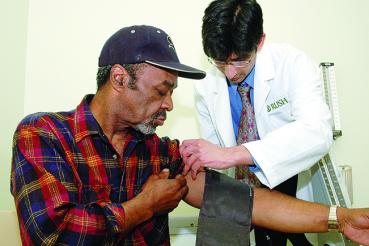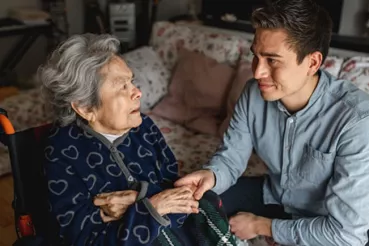Although our bodies adapt to meet our changing needs as we age, eventually, time takes its toll on the body — and often, it's a heavy toll. By middle age, many people are diagnosed with chronic illnesses, such as heart disease, high blood pressure and diabetes.
Yet researchers at Rush are finding that the severity of these aging-related changes is largely the result of lifestyle choices.
"Heart disease and other health issues that we associate with aging aren't inevitable," says Jack Olson, MD, a geriatrician at Rush. “Making healthy choices can slow some of the effects of time.”
He offers the following advice on how to reduce the risk of health problems down the road — so you'll be able to spend less time at the doctor's office and more time enjoying your golden years.
1. Don’t put stress on your heart.
Over time the heart walls become stiffer and the heart fills with blood more slowly. But contrary to conventional wisdom, cardiac output (the amount of blood pumped by the heart) doesn't diminish as you age — if you take care of yourself. Despite physical changes, an older heart can still function well.
In addition to the usual recommendations for maintaining a healthy heart, such as eating a healthful diet and exercising (at least 30 minutes, five or more times a week), Olson says that the most important thing you can do is to reduce stress.
Stress causes the body to release hormones such as adrenaline into the bloodstream, which speeds up the heart and can trigger serious heart problems, such as arrhythmias and heart attacks. To keep your stress levels low, try regular exercise, deep breathing, meditation, yoga or journaling — whatever works for you.
Another important part of stress-reduction is maintaining social connections. "Isolation can be a form of constant, low-level stress," Olson says.
2. Protect your kidneys from damage.
The kidneys become smaller as cells die off and aren't replaced. Less blood flows through them, they don't filter the blood as well, and they may not remove wastes as efficiently.
To prevent diseases that harm the kidneys, such as high blood pressure and diabetes, Olson recommends maintaining a healthy weight, exercising and not smoking. Also, whenever possible, avoid taking nonsteroidal anti-inflammatory drugs (NSAIDs), such as ibuprofen and aspirin, because they can damage the kidneys.
3. Make your lungs a smoke-free environment.
With age, the muscles used for breathing weaken. The number of air sacs and capillaries in the lungs decreases, resulting in less oxygen being absorbed with each breath.
"The best way to preserve lung function is to not smoke," Olson says. "Even secondhand smoke can affect lung function and increase your risk for lung disease."
Aside from that, staying fit and taking a few minutes each day to engage in deep breathing exercises will help keep your lungs functioning most efficiently.
The best way to preserve lung function is to not smoke. Even secondhand smoke can affect lung function and increase your risk for lung disease.
4. Exercise and stretch to keep your bones and joints in shape.
The body continually forms, breaks down and reforms bone. But with age, the balance changes and we break down more bone than we build.
Bones become less dense and more fragile. Osteoporosis — a condition in which the bones become brittle and break easily — affects both sexes, and men who smoke and postmenopausal women are at higher risk.
To help keep your bones strong and healthy, get plenty of weight-bearing exercise, such as walking; get adequate calcium and vitamin D; and don't smoke. And be sure to get a bone density test by age 65 or earlier if you are at risk.
Tendons and ligaments also change with time as the cells that maintain them become less active. Joints become more restricted and inflexible, and ligaments tear more easily and heal more slowly. Water content in the tendons decreases, causing them to become stiffer and less tolerant to stress. Stretching regularly can help you maintain joint flexibility.
5. Flex some muscle.
Muscle mass shrinks as the levels of growth hormone and testosterone, which stimulate muscle development, decrease.
While this is natural, many musculoskeletal changes are from inactivity. Long-term exercise can slow the loss of muscle mass, and weight training can increase muscle mass and strength.
6. Shield your skin from the sun's damaging rays.
As you get older, your body produces less of two vital proteins: collagen, which gives skin its strength and flexibility, and elastin, which enables skin to return to its original shape after being stretched.
This depletion of collagen and elastin causes your skin to wrinkle and lose its elasticity. In addition, the dermis (the skin's padding) thins as you age, making skin look transparent.
These changes are normal. But as it turns out, approximately 90 percent of age-related skin problems — including wrinkles and rough, blotchy skin — are actually caused by sun damage, Olson says. Wearing sunscreen on a regular basis and avoiding prolonged sun exposure can help protect your skin from sun damage.




